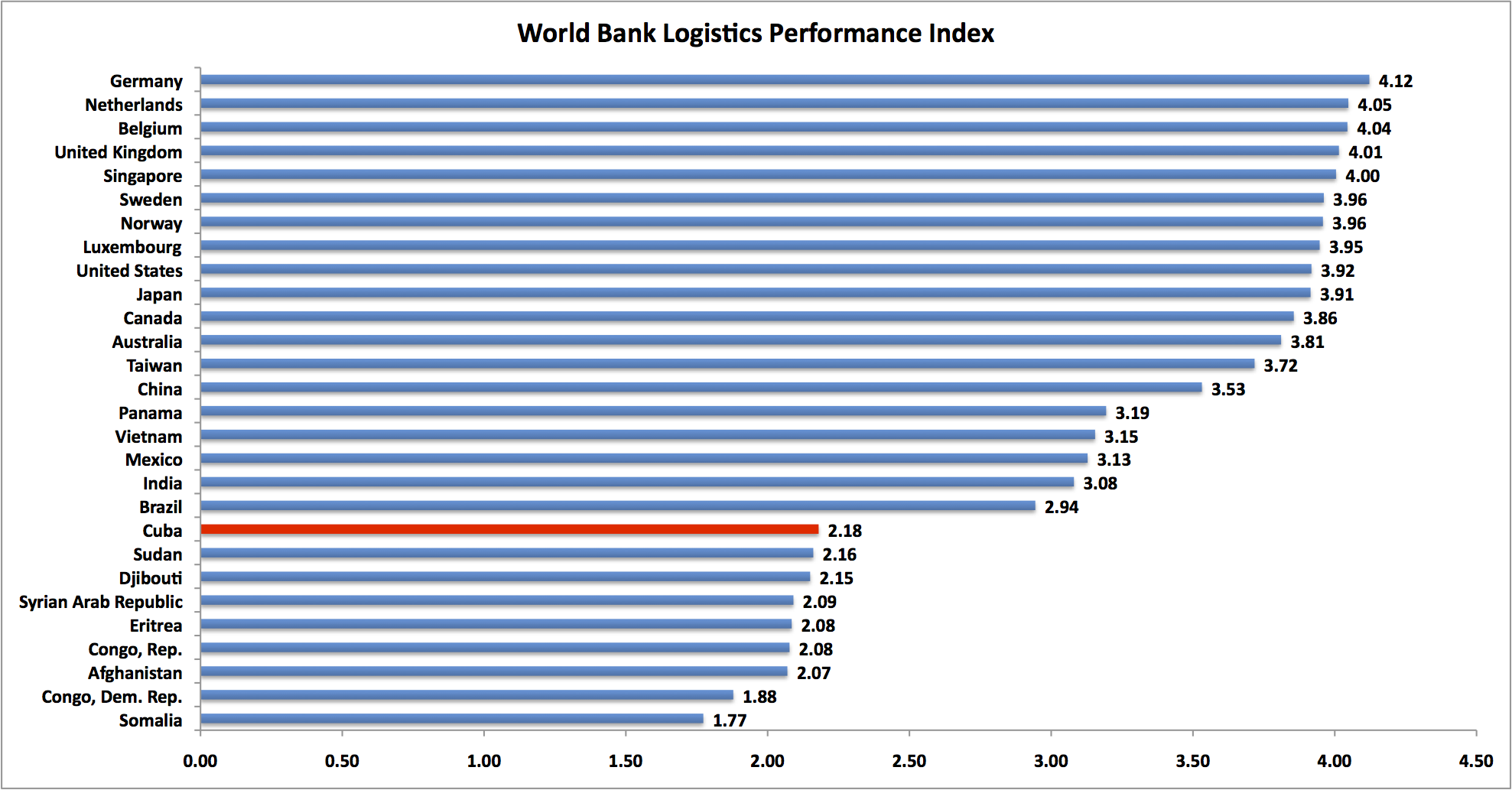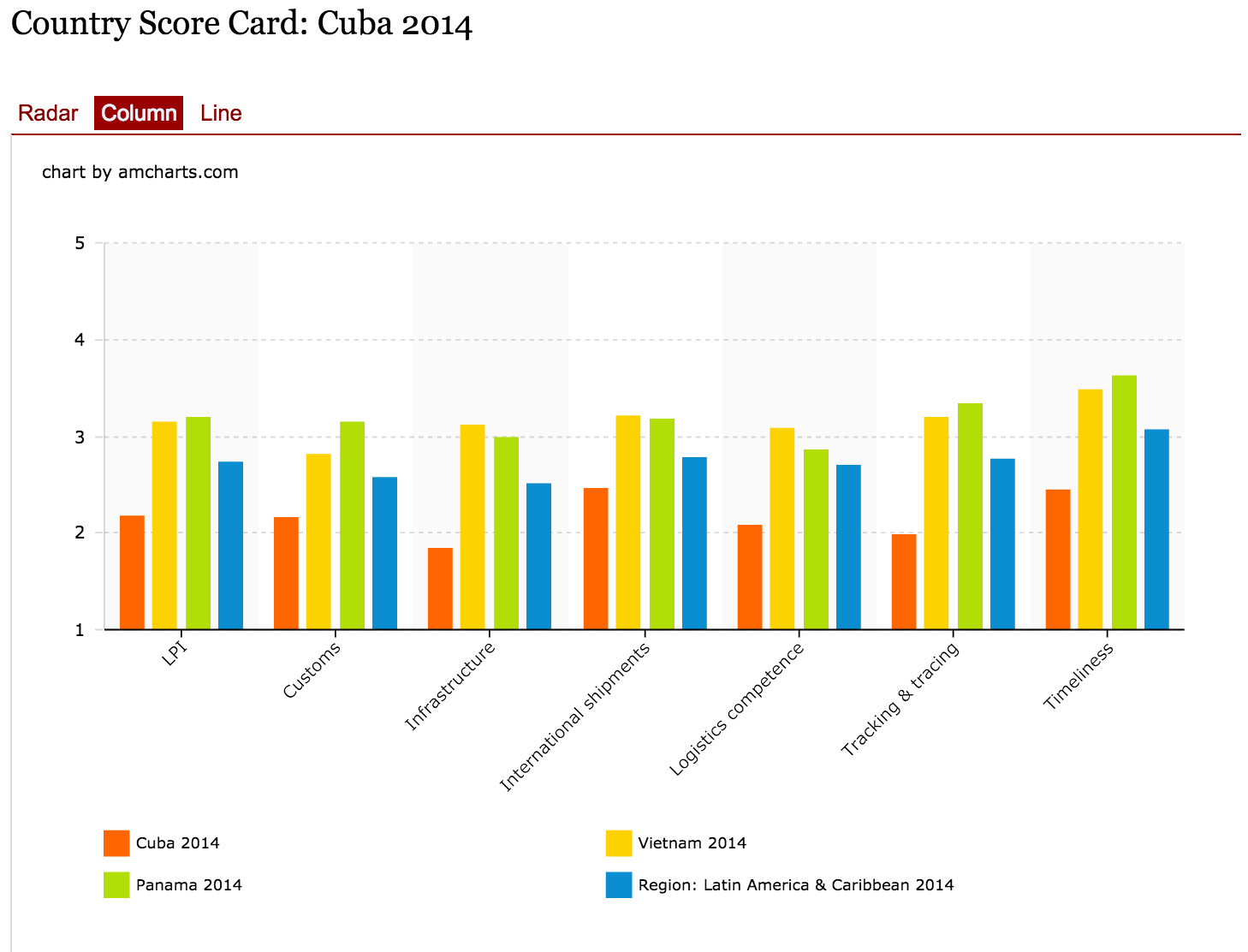Yesterday, the White House announced that President Obama plans to remove Cuba from the U.S. list of State Sponsors of Terrorism. According to Reuters, “Congress has 45 days to consider Obama’s decision before it takes effect, but lawmakers cannot stop it unless both chambers approve a joint resolution, a move that is highly unlikely.” This announcement follows a meeting between President Obama and Cuban President Raul Castro this past weekend at the Summit of the Americas, the first meeting between the leaders of both countries in almost 60 years.
Being the son of Cuban immigrants, people always ask me what I think about these developments. I shared my thoughts in a post back in December, after President Obama announced his intent to normalize U.S.-Cuba relations. You can read what I wrote below, which continues to reflect what I feel and think today.
All this talk about Cuba, however, sparked a question for me this week: Where does Cuba rank in logistics?
The answer, according to the World Bank’s Logistics Performance Index (LPI), is near the bottom of the list. Cuba was ranked 152 out of 160 countries with an LPI Score of 2.18, beating only Somalia, Afghanistan, Sudan, and a handful of other poorly-developed countries.

The logistics performance (LPI) is the weighted average of the country scores on the six key dimensions:
- Efficiency of the clearance process (i.e., speed, simplicity and predictability of formalities) by border control agencies, including customs;
- Quality of trade and transport related infrastructure (e.g., ports, railroads, roads, information technology);
- Ease of arranging competitively priced shipments;
- Competence and quality of logistics services (e.g., transport operators, customs brokers);
- Ability to track and trace consignments;
- Timeliness of shipments in reaching destination within the scheduled or expected delivery time.
As the chart below shows, Cuba significantly lags Panama, the highest ranking country in the Latin America & Caribbean region with a LPI Score of 3.19. It also lags the average LPI for the region, as well as Vietnam, a country that mirrors Cuba in many ways, but is ranked 48th overall with an LPI Score of 3.15 — ahead of Mexico, India, and Brazil.

Back in 2001, my friend and logistics expert Art Van Bodegraven traveled to Cuba as part of a logistics delegation. He shared with me a copy of his trip report, and here’s an excerpt that I believe probably still sums up the situation today, fourteen years later:
The faculty members from ISPJAE [an academic institution] were astonishingly fluent in contemporary supply chain and logistics thinking. Their papers, if translated into English, would not have been out of place – and would have held their own – at CLM, WERC, or other major conferences. They know the concepts and all the buzzwords. But, they have very few venues in which to apply them. So, they’ve got the words, but no music. We used to call this condition “all dressed up, with no place to go.”
I hope to have Art as my guest on Talking Logistics soon to discuss his observations during that trip in more detail. Stay tuned.
There is at least one bright spot in Cuba’s logistics infrastructure: it’s deep water ports. As reported in Logistics Management earlier this week:
The Port of Mariel…may soon become a magnet for Caribbean Basin trade. With the Panama Canal on course for expansion early next year, and Nicaragua’s “Grand Canal” in early development, Cuba could be in the sweet spot for future world trade and logistics. This should put U.S. port authorities on high alert, as Mariel has been dredged to 58-feet – capable of handling the new generation of mega-carriers – and is well positioned to become an offshore manufacturing hub for companies seeking cheaper sourcing operations.
Then again, that has always been the story of Cuba: a country with so much future potential, always unrealized.
—–
Being the son of Cuban immigrants, people have been asking me what I think about the move by President Obama to normalize relations with Cuba. I really don’t know what to think. My brain tells me one thing, my gut another. Which do I trust?

When I visited Cuba with my father in 2004, we drove several hours from Cienfuegos to Camaguey to visit my aunt Z and her family. We had lunch at her house, and after we ate, I found myself alone in the kitchen with my cousin’s wife R, helping her clear the dishes. My cousin O, in his late twenties at the time, suffered from kidney failure, and he and R would get up at dawn multiple times a week and hitchhike to the dialysis clinic several towns away (despite what you might read elsewhere, the healthcare system in Cuba is miserable). While O underwent dialysis, R would stand outside the clinic and sell pasteles or whatever else she managed to cook the night before with whatever meager ingredients she could find. Then they would hitchhike back home, the sun setting on their backs, exhausted. We cleared the plates in silence, but I could tell she wanted to say something to me, and then she did, turning around to face me: “I hope you thank God every day that you were born where you are.” Time stopped for a moment and we just looked at each other, long enough for me to see the sadness in her eyes, or maybe it was hurt or disappointment, and long enough for her to see the truth in mine, and then she walked away before I could say anything, and what could I say anyway? We didn’t speak again that day, or ever again.
My cousin O died a few years ago, on a summer afternoon while sitting in the dialysis chair at the clinic. “I feel cold,” he told his his mother, and by the time she came running back with the doctor, he was gone. Not long after, my uncle died from prostate cancer, although everyone says it was really from a broken heart. And last year my aunt Z died after a short battle with breast cancer. On that side of my family, only R remains in Cuba, along with my cousin Zu and her son.
It doesn’t matter what I think about this change in U.S.-Cuba relations. For ten years now, I’ve been going back to that kitchen with R and what she said to me. It’s the voice in my gut. May R and all Cubans get to the point where they can thank God every day that they were born where they are.










